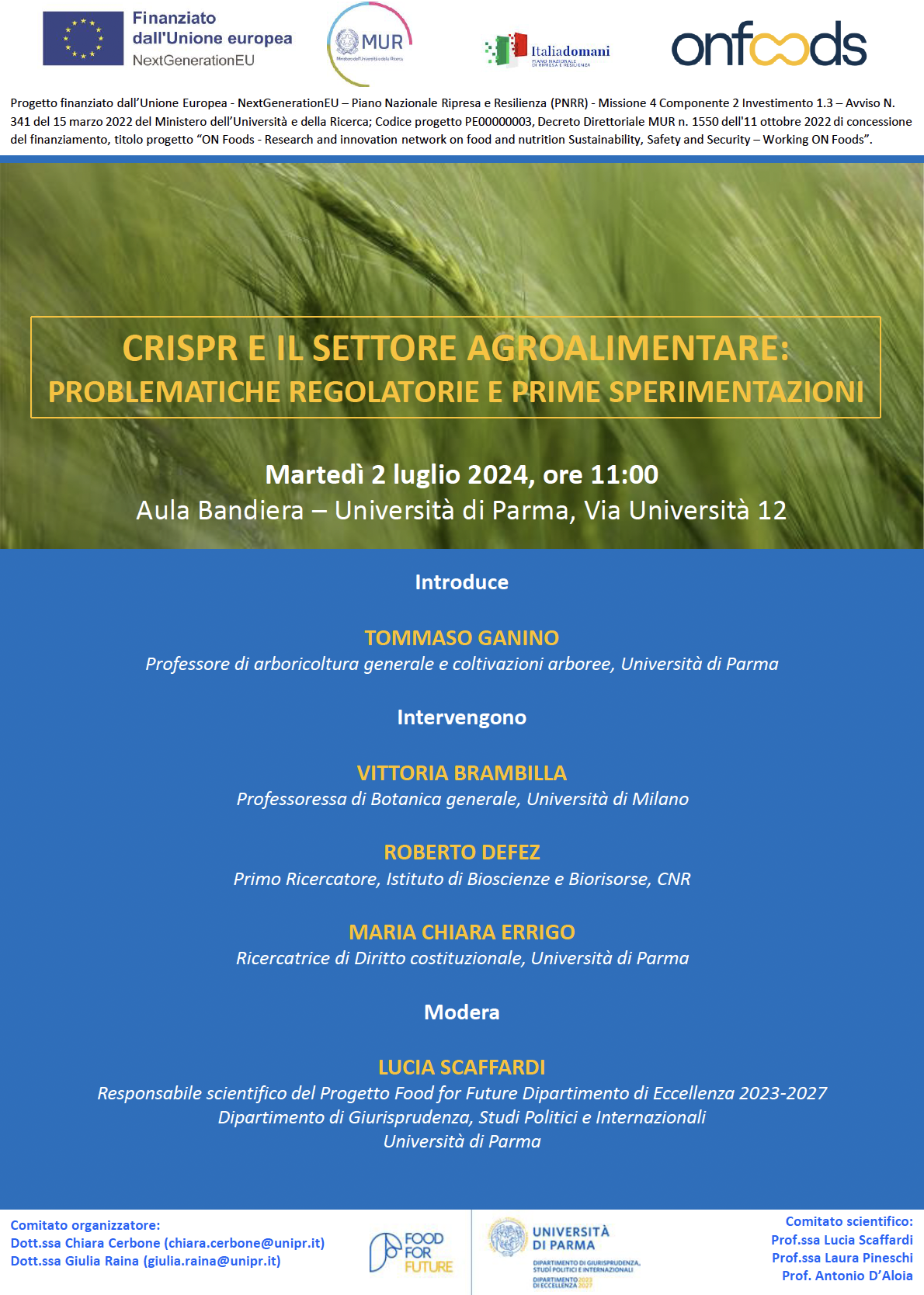Funded under the National Recovery and Resilience Plan (NRRP), Mission 4 Component 2 Investment 1.3, Theme 10.
Genome editing: navigating regulatory challenges and innovations in Agri-Food
The University of Parma, with Onfoods and Food for Future, is meeting to address the challenges and prospects of using new genomic techniques in the agri-food sector.
The University of Parma, with Onfoods and Food for Future, is meeting to address the challenges and prospects of using new genomic techniques in the agri-food sector. Through regulatory complexities and the need for innovation, aiming to shape the food supply chain of the future.
On Tuesday, July 2nd, at 11:00 AM in the Aula Bandiera of the Central Building of the University of Parma, the event titled "CRISPR and the Agri-Food Sector: Regulatory Issues and Initial Experiments" will occur. This study session is part of the Spoke 1 activities of Onfoods and within the "Food for Future" project of the Department of Law, Political and International Studies.
Lucia Scaffardi, head of the Food for Future project, will moderate the meeting. After the opening by Tommaso Ganino, professor of General Arboriculture and Tree Cultivations at the University of Parma, Vittoria Brambilla and Fabio Fornara, leaders of the Ris8imo project, will speak. Then, Roberto Defez, a researcher at the CNR in Naples, and Maria Chiara Errigo, a Constitutional Law researcher at the University of Parma will conclude.

Assisted Evolution Technologies (TEA) in the agri-food sector
The event will analyze the potential and regulatory difficulties of new genomic techniques, also known as Assisted Evolution Technologies (TEA), in the agri-food sector. These techniques allow for more precise modifications than traditional GMOs improving food security and resistance to pathogens and adverse conditions related to climate change. Recently, it was a main theme about their potential to address hunger and poverty, increasingly relevant topics due to population growth, global conflicts, and changes in food supply dynamics.
However, the commercialization and experimentation of genetically modified varieties are complex due to regulations that equated these techniques with GMOs since 2018. There are, however, significant developments. In Europe, a new regulation is being approved to simplify the authorization process for products derived from these techniques, called "new genomic techniques" (NTG), differentiating them from GMOs. In Italy, Law 68 of June 2023 was approved thanks to an amendment to the Drought Decree. This has allowed the possibility of cultivating varieties obtained through new genomic techniques, such as CRISPR/CAS9, for research purposes. The procedure has been entrusted to ISPRA, the Higher Institute for Environmental Protection and Research, to simplify the approval process.
The regulation specifies that if a food product is indistinguishable from a pre-existing product not undergoing genetic modifications, it will fall into the TEA1 cluster and be accepted. If, however, it is different and thus distinguishable, it will be placed in the TEA2 group and defined as a GMO, subject to the same regulations and limitations.
The difference from a GMO product lies in the technology behind the genetic modification. While a GMO product can result from transgenesis, the transfer of genetic material from one species to another, TEA is obtained exclusively through cisgenesis. Cisgenesis involves taking genetic material from the same species, often from the same individual. This is achieved with a higher degree of precision thanks to CRISPR/CAS9. The discovery of the CRISPR/CAS9 method earned Emmanuelle Charpentier and Jennifer Doudna the 2020 Nobel Prize in Chemistry, revolutionizing various scientific fields, from medicine to chemistry to food.
The true paradigm shift is the specific editing process, involving an intricate cut-and-paste genetic system. Specifically, the CRISPR/CAS9 complex consists of CRISPR, a part of DNA found in bacteria that serves as memory, and CAS9, an enzyme that allows sequence cutting. It is enough to locate the segment within the genome to eliminate a detrimental segment for the plant's productivity. It is enough to locate the segment within the genome. Then, the CRISPR/CAS9 complex will select and surgically remove it. Furthermore, replacing this segment with another previously chosen one brings a precise modification. This operation is simpler and cheaper than producing GMOs, which requires numerous attempts to find the right combination.
The principle of TEA, ultimately, is to accelerate a spontaneous process that could naturally occur under specific conditions and over a longer period.
In May 2024, the first Italian experiment began in the province of Pavia with the Ris8imo project, which involved cultivating Telemaco rice. This variety was resistant to the fungus Pyricularia oryzae, the cause of rice blast, a rice crop disease, avoiding fungicides and thus their environmental impact. Vittoria Brambilla and Fabio Fornara, professors of General Botany at the State University of Milan, and six other collaborators, led the project.
Unfortunately, the experiment was compromised by vandalism on the night of June 20-21. The attackers broke the netting and tampered with surveillance cameras, uprooting the rice plants.
This is an act against science and research in a sector already facing legislative challenges. These and other topics will be discussed during the event on July 2nd in Parma.



